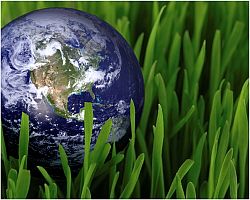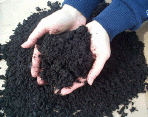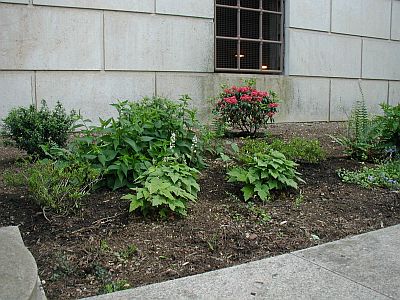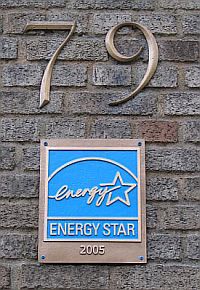Doing Our Part
How We Are Greening DEEP
| DEEP is charged with protecting Connecticut's environment and we "walk the talk" by making our Agency as green as possible. | |
|
Our experience in greening our Agency will give you ideas about how your workplace can conserve energy and natural resources, reduce air and water pollution, and reduce greenhouse gas emissions while creating a comfortable workplace.
For information on greening your office or forming a green team, contact Connie Mendolia or Jennifer Weymouth. |
 |
|
Check out our Going Green Makes Sen$e materials for state agencies! | |
|
Why form a green team? Mary Sherwin, one of the Green Team coordinators who has recently reitred, says it best: Green teams send out a vibe to the rest of an organization, saying: "We can do this. We can make a difference. We can cut our environmental impact." They are an invitation to get involved - becoming the change we want to see - starting at work.
Green teams bring together staff from all parts of an agency to brainstorm, plan and carry out projects that further the goals of the team. They provide a forum to create and identify problems and implement creative strategies to reduce the environmental impact of the agency. Green teams are about continuous improvement, so if we’re not doing it, how can we expect it of others?
|
|
Communication, Education and Activities |
|
Communication is key to greening our workplace. Here's how we keep our employees involved and informed about our programs and accomplishments:
|
|
Recycling isn't just the right thing to do; Everyone must recycle - it's the law. At DEEP we recycle all the mandated items, plus alkaline batteries, electronics and electronic accessories, packing materials, Tyvek envelopes, printer ink jet and laser toner cartridges, magazines and other kinds of mixed paper.
On our internal website, we explain where to recycle each material we collect and how to prepare it. Recycling containers for paper are placed in each break room and employees have white paper recycling containers at their desks. All other materials are collected in our mailroom.
|
|
DEEP has a long history of recycling high grade white office paper as began recycling mixed paper before it was a state mandated item. At 79 Elm Street, each paper stream is collected separately rather than as a single stream. We purchased matching containers a few years ago along with attached signage to make it easier for visitors and staff to recycle efficiently.
|
 |
What did you do with the apple core or coffee grounds left over from lunch? If you work at DEEP headquarters, you'd drop it off in one of the compost buckets available in the break room on every floor. DEEP employees have been composting food scraps since 1997. The finished compost has been used in our front garden at 79 Elm, in a new butterfly garden at Dinosaur State Park, and in general garden renovation at Penwood State Park. |
|
For more information, contact the Recycling Program at (860) 424-3366. | |
|
We developed a "Commuter Connection" webpage on our internal website to make it easier for our employees to find other ways of getting to work besides driving alone. There, employees can find information about CTRides, buses and rail routes and carpooling.
We hold transportation fairs with CTRides for our employees to learn about their commuting options.
We even have a bike available for employees to use to get to a meeting close by!
Employees are also encouraged to save fuel and reduce air pollution by using one of the State's hybrid gas electric cars for work-related travel.
For more information, contact Connie Mendolia. |
| Native Plant Garden | |
|
Have you noticed the small garden space in the front of our building? It's not filled with typical plantings. When the gardens in front of our building needed refurbishing, many of our employees, native plant experts and enthusiastic gardeners, took up the task.
DEEP staff, on their own time, designed, prepared and planted a beautiful perennial garden using native plants. The garden provides subtle color and texture and year-round and food for birds. |
 |
|
Do you have a drawer full of used paper clips, too many pencils or an overload of file folders? If you worked at DEEP you'd have a place where you could offer those things to other DEEP staff for reuse in the office. In our building on 79 Elm St., we have a ReSupply Center where staff can drop off used, but still in good condition, office supplies. Many items can be reused, saving thousands of dollars as well as natural resources.
|
|
DEEP joined the State Electronics Challenge (SEC). This is a voluntary program that encourages state, regional, and local governments, including schools and other public entities, to purchase greener electronic products, reduce the impacts of electronic products during use and manage obsolete electronics in an environmentally safe way. Find put more about the SEC.
|
 |
Back in June 2005, we received an Energy Star plaque from the US EPA for being an energy efficiency building with an Energy Star score in the high 90s.
We've continued to rank in the high 90 percentile by making continuous energy improvements in our main office, such as installing occupancy sensor lighting controls, removing the middle lamp in overhead lighting fixtures and utilizing the Lead by Example program.
|
|
Green Cleaners |
|
Strong chemical smells can cause an allergic or worse reaction in some people and make buildings a toxic environment for employees and visitors.
DEEP lead the way to introduce less toxic cleaning products and environmentally preferable products for dish washing and hand washing. It is now a state law that state agencies must purchase environmentally preferable cleaning products.
|
|
Just like any office, DEEP has trainings, celebrations, activities and campaigns like Charitable Giving and many times these events involve food and potentially, a lot of trash.
We've tried to keep the trash to a minimum by asking staff to make a habit of bringing a reusable plates, silverware and mugs to events and meetings. We also provide compost buckets and put them in a convenient place so staff can compost their food scraps.
Training can also have a big impact on the environment. We encourage double-sided copying, using a flip chart to post the agenda. Check out some other ideas to "green" training.
|
Last updated October 2019

